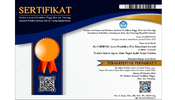PENGARUH MANAJEMEN KELAS TERHADAP HASIL BELAJAR PENDIDIKAN AGAMA ISLAM SISWA KELAS IV
(1) Institut Agama Islam Negeri Syekh Nurjati Cirebon
(*) Corresponding Author
Abstract
Abstrak
Tujuan penelitian ini adalah untuk mengungkap tentang sejauhmana pengaruh manajemen kelas terhadap hasil belajar siswa pendidikan Agama Islam kelas IV Ali bin Abi Tholib di Madrasah Hidayatus Shibyan Kabupaten Cirebon. Jenis penelitian ialah kuantitatif korelasional dengan pengumpulan datanya melalui angket, dokumentasi lapangan, dan wawancara. Dari hasil penelitian diketahui bahwa berlandaskan hasil pengujian terhadap 17 peserta didik, diketahui bahwa pengaruh manajemen kelas kurang signifikan terhadap hasil belajar Pendidikan Agama Islam peserta didik. Hal ini ditunjukkan dari hasil perhitungan korelasi menunjukan bahwa variable x dan y terdapat peningkatan yang tidak berlawanan arah. Meskipun hasil perhitungan korelasi rendah, tetapi antara varibel x dan y memiliki hubungan yang saling mempengaruhi. Hasil belajar siswa dapat dilihat dari perhitungan tes yang hasilnya 23% persen siswa adalah tergolong predikat sangat rendah. Dengan demikian hipotesis kerja ditolak dan hipotesis nol diterima.
Kata kunci: hasil belajar, korelasi, manajemen kelas,
Â
Abstract
The purpose of this study was to reveal the extent to which the influence of classroom management on the learning achievement of Islamic religious education of Ali bin Abi Tholib four graders in Madrasa Hidayatus Shibyan Cirebon Regency. The type of the research was correlational quantitative in which the data collection was conducted through questionnaires, field documentation, and interviews. The results show that according to the test results towards 17 students, it is found that that the influence of classroom management is less significant on the learning outcomes of students’ Islamic Religious Education. It is revealed by the result of correlational calculation showing that variables x and y present improvement in an opposite direction. Although the result of the correlational calculation is low, between variables x and y there is a mutually influential relationship. Students’ learning outcomes can be seen from the calculation of the test showing that 23% percent of students belongs to very low category. Therefore, the working hypothesis is rejected and the null hypothesis is accepted.
Keywords: learning achievement, correlation, classroom managementFull Text:
PDFReferences
Adeyemo, S. A. (2012). “The Relationship between Effective Classroom Managemetn and Students' Academic Achievementâ€. European Journal of Educational Studies, 4 (3), 376-381.
Castellan, C. M. (2010) “Quantitative and Qualitative Research: A View for Clarityâ€, dalam International Journal of Education. Vol 2, (2).
Danim, S. (2002). Inovasi Pendidikan dalam Upaya Peningkatan Profesionalisme Tenaga Kependidikan. Bandung: PT. Remaja Rosda Karya.
Gross, Richard. (2015). Psychology: The Science of Mind and Behaviour. London, United Kingdom: Hachette UK.
Kandler, C. & Bleidorn, W. (2015). “Personality Differences and Development: Genetic and Environmental Contributionsâ€. D. Wright (ed.), The International Encyclopedia of Social and Behavioral Sciences, 2nd Edition. Elsevier Science Ltd., 884-890.
Karban, R. (2015). Plant Learning and Memory. In: Plant Sensing and Communication. Chicago and London: The University of Chicago Press.
Karwati, E. (2014). Manajemen Kelas. Bandung: Alfabeta.
Kurniawan, A. (2018). Metodologi Penelitian Pendidikan. Bandung: Remaja Rosdakarya.
Nagler, K. S. (2016). “Effective Classroom-Management & Positive Teachingâ€. English Language Teaching, 9 (1), 163-172.
Omenka, J. E. & Otor, E. E., (2015). “Influence of Classroom Management on Students’ Academic Achievement in Science and Mathematic in Oju Local Government Area of Benue State,†dalam Global Journal of Interdisciplinary Social Sciences. Vol..4 (4), 36-40.
Piaroi, M. S. (2018). “Classroom Management and Students’ Academic Performance in Public Secondary Schools in Rivers Stateâ€. International Journal of Scientific Research in Education, Vol. 11 (5), 940-963.
Saefullah. (2012). Psikologi Perkembangan dan Pendidikan. Bandung: CV Pustaka Setia.
Saifi, I L., dkk. (2018). “Impact of Classroom Management on Students' Achievement at Universiti Levelâ€. Asian Innovative Journal of Social Sciences & Humanities (AIJSSH), Vol. 2 (2), 13-27.
Saggaf, dkk. (2017). “The Effect of Classroom Management on Student Learning Outcomesâ€. The 1st International Conference on Education, Science, Art and Technology (the 1st ICESAT) Universitas Negeri Makassar. 22 – 23 Juli, 98-102.
Schacter, dkk. (2011). Psychology. 2nd edition. Worth Publishers.
DOI: 10.24235/ath.v29i1.5008
Article Metrics
Abstract view : 100 timesPDF - 23 times
Refbacks
- There are currently no refbacks.
Copyright (c) 2022 AL-TARBIYAH: Jurnal Pendidikan (The Educational Journal)

This work is licensed under a Creative Commons Attribution 4.0 International License.








